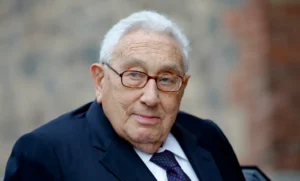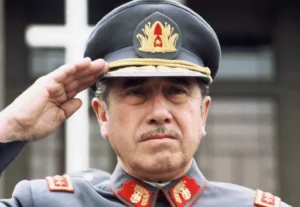Henry Kissinger (27 May 1923 – 29 Nov 2023) War Criminal Finally Dies
OBITUARIES, 4 Dec 2023
Robert Reich – TRANSCEND Media Service
30 Nov 2023 – Henry Kissinger has died, at the age of 100.
When a former high government official as well known as Kissinger passes, the conventional response is to say nice things about what they accomplished.
I’m sorry, but I cannot. In my humble opinion, Kissinger should have been considered a war criminal.
One telling illustration was Kissinger’s role in overthrowing the elected socialist government of Salvador Allende in Chile, and encouraging the mass murder of thousands of innocent Chileans under the Operation Condor (war on Communism).
On September 12, 1970, eight days after Allende’s election, Kissinger initiated a discussion on the telephone with CIA Director Richard Helms about a preemptive coup in Chile.
“We will not let Chile go down the drain,” Kissinger declared.
“I am with you,” Helms responded.
Three days later, Nixon, in a 15-minute meeting that included Kissinger, ordered the CIA to “make the [Chilean] economy scream,” and named Kissinger as the supervisor of the covert efforts to prevent Allende from being inaugurated.
Kissinger ignored a recommendation from his top deputy on the NSC, Viron Vaky, who strongly advised against covert action to undermine Allende.
On September 14, 1970, Vaky wrote a memo to Kissinger arguing that coup plotting would lead to “widespread violence and even insurrection.” He also argued that such a policy was immoral: “What we propose is patently a violation of our own principles and policy tenets .… If these principles have any meaning, we normally depart from them only to meet the gravest threat to us, e.g. to our survival. Is Allende a mortal threat to the U.S.? It is hard to argue this.”
After U.S. covert operations, which led to the assassination of Chilean Commander in Chief of the Armed Forces General Rene Schneider, failed to stop Allende’s inauguration on November 4, 1970, Kissinger lobbied Nixon to reject the State Department’s recommendation that the U.S. seek a modus vivendi with Allende.
While Schneider was dying in the Military Hospital in Santiago on October 22, 1970, Kissinger told Nixon that the Chilean military turned out to be “a pretty incompetent bunch.” Nixon replied: “They are out of practice,” according to documents released in August by the U.S. National Security Archive.
In an eight-page secret briefing paper that provided Kissinger’s clearest rationale for regime change in Chile, he emphasized to Nixon that “the election of Allende as president of Chile poses for us one of the most serious challenges ever faced in this hemisphere” and “your decision as to what to do about it may be the most historic and difficult foreign affairs decision you will make this year.”
Not only were a billion dollars of U.S. investments at stake, Kissinger reported, but so was what he called “the insidious model effect” of his democratic election.
There was no way for the U.S. to deny Allende’s legitimacy, Kissinger noted, and if he succeeded in peacefully reallocating resources in Chile in a socialist direction, other countries might follow suit.
“The example of a successful elected Marxist government in Chile would surely have an impact on — and even precedent value for — other parts of the world, especially in Italy; the imitative spread of similar phenomena elsewhere would in turn significantly affect the world balance and our own position in it.”
The next day Nixon made it clear to the entire National Security Council that the policy would be to bring Allende down. “Our main concern,” he stated, “is the prospect that he can consolidate himself and the picture projected to the world will be his success.”
In the days following the September 11, 1973, coup, Kissinger ignored the concerns of his top State Department aides about the massive repression by the new military regime. He sent secret instructions to his ambassador to convey to Pinochet “our strongest desires to cooperate closely and establish firm basis for cordial and most constructive relationship.”
When Kissinger’s assistant secretary of state for inter-American affairs asked him what to tell Congress about the reports of hundreds of people being killed in the days following the coup, Kissinger issued these instructions: “I think we should understand our policy — that however unpleasant they act, this government is better for us than Allende was.”
The United States assisted the Pinochet regime in consolidating, through economic and military aid, diplomatic support, and CIA assistance in creating Chile’s infamous secret police agency, DINA.
When Nixon complained about the “liberal crap” in the media about Allende’s overthrow, Kissinger advised him: “In the Eisenhower period, we would be heroes.”
At the height of Pinochet’s repression in 1975, Kissinger met with the Chilean foreign minister, Admiral Patricio Carvajal.
Rather than press the military regime to improve its human rights record, Kissinger opened the meeting by disparaging his own staff for putting the issue of human rights on the agenda.
“I read the briefing paper for this meeting and it was nothing but Human Rights,” Kissinger told Carvajal. “The State Department is made up of people who have a vocation for the ministry. Because there are not enough churches for them, they went into the Department of State.”
When Kissinger prepared to meet Pinochet in Santiago in June 1976, his top deputy for Latin America, William D. Rogers, advised him to make human rights central to U.S.-Chilean relations and to press the dictator to “improve human rights practices.”
Instead, a declassified transcript of their conversation reveals, Kissinger told Pinochet that his regime was a victim of leftist propaganda on human rights. “In the United States, as you know, we are sympathetic with what you are trying to do here,” Kissinger told Pinochet. “We want to help, not undermine you. You did a great service to the West in overthrowing Allende.”
The Chilean government has formally requested that the Biden administration publish documentation from 1973 and 1974 on what was said in the Oval Office before and after the coup led by Pinochet.
“We still don’t know what President Nixon saw on his desk the morning of the military coup,” Chile’s ambassador to the United States, Juan Gabriel Valdés, says. “There are details that remain of interest to [Chileans], that are important for us to reconstruct our own history.”
An appropriate response to Kissinger’s death would be for the U.S. to own up to the entirety of what Nixon and Kissinger wrought.
_______________________________________________
 Robert Reich is Chancellor’s Professor of Public Policy at the University of California at Berkeley and Senior Fellow at the Blum Center. He served as Secretary of Labor in the Clinton administration, for which Time Magazine named him one of the 10 most effective cabinet secretaries of the twentieth century. He has written 17 other books, including the best sellers Aftershock, The Work of Nations, Beyond Outrage, Saving Capitalism: For the Many, Not the Few and The Common Good. His new book, The System: Who Rigged It, How We Fix It, is out now. He is a founding editor of the American Prospect magazine, founder of Inequality Media, a member of the American Academy of Arts and Sciences, and co-creator of the award-winning documentaries Inequality for All, streaming on YouTube, and Saving Capitalism, now streaming on Netflix. robertreich.substack.com
Robert Reich is Chancellor’s Professor of Public Policy at the University of California at Berkeley and Senior Fellow at the Blum Center. He served as Secretary of Labor in the Clinton administration, for which Time Magazine named him one of the 10 most effective cabinet secretaries of the twentieth century. He has written 17 other books, including the best sellers Aftershock, The Work of Nations, Beyond Outrage, Saving Capitalism: For the Many, Not the Few and The Common Good. His new book, The System: Who Rigged It, How We Fix It, is out now. He is a founding editor of the American Prospect magazine, founder of Inequality Media, a member of the American Academy of Arts and Sciences, and co-creator of the award-winning documentaries Inequality for All, streaming on YouTube, and Saving Capitalism, now streaming on Netflix. robertreich.substack.com
Go to Original – robertreich.substack.com
Tags: Henry Kissinger, Obituary, War crimes
DISCLAIMER: The statements, views and opinions expressed in pieces republished here are solely those of the authors and do not necessarily represent those of TMS. In accordance with title 17 U.S.C. section 107, this material is distributed without profit to those who have expressed a prior interest in receiving the included information for research and educational purposes. TMS has no affiliation whatsoever with the originator of this article nor is TMS endorsed or sponsored by the originator. “GO TO ORIGINAL” links are provided as a convenience to our readers and allow for verification of authenticity. However, as originating pages are often updated by their originating host sites, the versions posted may not match the versions our readers view when clicking the “GO TO ORIGINAL” links. This site contains copyrighted material the use of which has not always been specifically authorized by the copyright owner. We are making such material available in our efforts to advance understanding of environmental, political, human rights, economic, democracy, scientific, and social justice issues, etc. We believe this constitutes a ‘fair use’ of any such copyrighted material as provided for in section 107 of the US Copyright Law. In accordance with Title 17 U.S.C. Section 107, the material on this site is distributed without profit to those who have expressed a prior interest in receiving the included information for research and educational purposes. For more information go to: http://www.law.cornell.edu/uscode/17/107.shtml. If you wish to use copyrighted material from this site for purposes of your own that go beyond ‘fair use’, you must obtain permission from the copyright owner.

